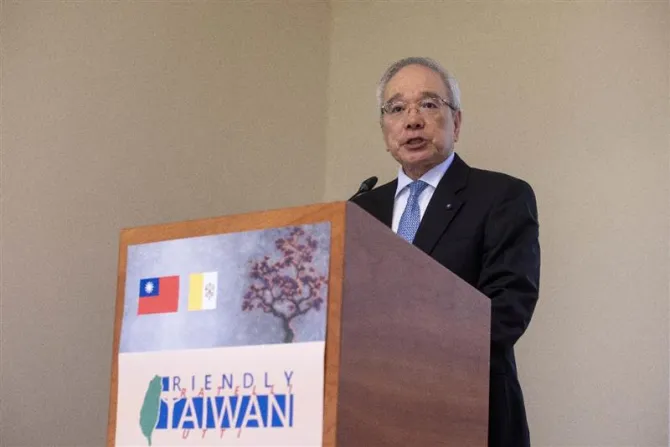Taiwan’s ambassador to the Holy See spoke Thursday about the importance of maintaining peace and stability across the Taiwan Strait, urging the necessity of democracies to “hold firm in resisting authoritarian aggression together.”
Speaking at a reception on Oct. 5 with members of the diplomatic corps accredited to the Vatican, Ambassador Matthew Lee underlined that “Taiwan will do whatever we can to remain on the road of peace.”
“It is my firm belief that preventing a war beforehand is much more critical than stopping a war afterwards,” Lee said.
“The ravaging conflict in Ukraine has shown us the cruelty of war, which brings nothing but atrocity to the world. Quoting the Holy Father’s words, ‘in order to have true human development, we need to work tirelessly to avoid war and to be at the service of peace,’” he added.
Vatican City State is the only remaining country in Europe that recognizes Taiwan as a country.
Bishop Norbert Pu of Kiayi, Taiwan, told CNA at the event that the Holy See’s diplomatic recognition of Taiwan is very important not only to Taiwanese Catholics but also to all of the Taiwanese people.
“We really hope that we will be recognized all over the world,” he added.
The Taiwanese bishop is a delegate in the Synod on Synodality assembly taking place at the Vatican this month. Cardinal Stephen Chow of Hong Kong and two bishops from mainland China are also participating in the assembly.
The Holy See has had formal diplomatic relations with Taiwan, formally called the Republic of China (ROC), since 1922, while the Church has not had an official diplomatic presence on the mainland People’s Republic of China (PRC) since it was officially expelled by Beijing in 1951.
“Taiwan and the Holy See share warm and friendly relations which have been growing continuously for over 81 years,” Lee said at the reception. “We are extremely proud of what we have been able to achieve together to contribute to the staunch promotion of peace, justice, evangelization, and humanitarian efforts around the globe.”
Archbishop Angelo Zani, the Vatican Library’s archivist and librarian, also spoke at the Taiwan embassy event following his visit to Taiwan earlier this year.
The embassy reception was an early celebration of Taiwan’s national day on Oct. 10. The day marks the uprising in 1911 that ultimately led to the establishment of the Republic of China before it moved to the island of Taiwan.
The island, fewer than 110 miles off the coast of China and home to a population of more than 23 million people, has maintained a vibrant democracy with robust civil liberties despite increased pressure from Beijing regarding the island’s status.
Only 14 states worldwide still have full diplomatic relations with Taiwan, among them Guatemala, Haiti, and Paraguay. The Chinese Communist Party government in mainland China views Taiwan as a rebel province and has put pressure on countries to cut diplomatic ties with the island.
Amid concern over what a Vatican decision to renew its 2018 provisional accord with Beijing would mean for the Holy See’s diplomatic relationship with Taiwan, a spokesperson for Taiwan’s Ministry of Foreign Affairs said in 2020 that it had received assurances from the Vatican regarding the renewal of the Vatican-China deal.
“While Communist China continues to provoke and intimidate Taiwan, Japan, and other neighboring countries by dispatching military aircraft and vessels in the Taiwan Strait, the East and South China Seas, these attempts clearly demonstrate that China’s authoritarian expansionist ambitions are not confined to Taiwan but extend to exerting its influence worldwide and changing the rules-based international order,” Lee said.
“Taiwan has constantly reached out to China to seek for any kind of equal dialogue and common grounds, to avoid any possible conflict. Taiwan, as a sovereign state, is the frontline democracy, and it is absolutely vital that democratic countries hold firm in resisting authoritarian aggression together. Taiwan will jointly create a democratic and resilient alliance to protect the rules-based international order and ensure an open and prosperous Indo-Pacific region.”
